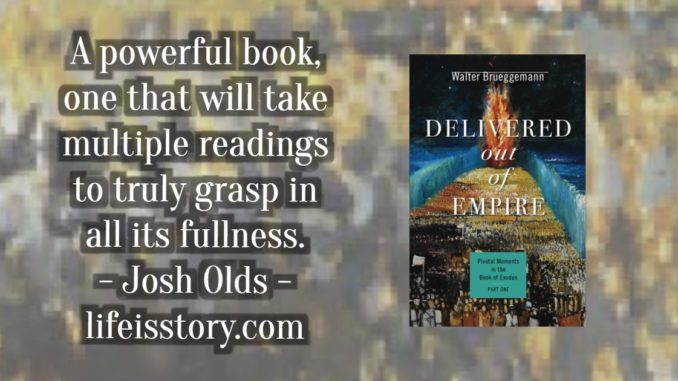
Also by this author: Virus as a Summons to Faith: Biblical Reflections in a Time of Loss, Grief, and Uncertainty
Published by Westminster John Knox Press on February 16, 2021
Goodreads
The book of Exodus brims with dramatic stories familiar to most of us: the burning bush, Moses’ ringing proclamation to Pharaoh to “Let my people go,” the parting of the Red Sea. These signs of God’s liberating agency have sustained oppressed people seeking deliverance over the ages. But Exodus is also a complex book. Reading the text firsthand, one encounters multilayered narratives: about entrenched socioeconomic systems that exploit the vulnerable, the mysterious action of the divine, and the giving of a new law meant to set the people of Israel apart. How does a contemporary reader make sense of it all? And what does Exodus have to say about our own systems of domination and economic excess?
In Delivered out of Empire, Walter Brueggemann offers a guide to the first half of Exodus, drawing out “pivotal moments” in the text to help readers untangle it. Throughout, Brueggemann shows how Exodus consistently reveals a God in radical solidarity with the powerless.
Walter Brueggemann has long established himself as one of the most thoughtful, reflective scholars in the Christian tradition. There are few people who can make the Old Testament come to life with contemporary application like Brueggemann. His life’s work has been a repudiation of the excesses of capitalism, nationalism, and militarism, something that finds perfect harmony in Delivered Out of Empire, a thoughtful look at the first fifteen chapters of Exodus.
Brueggemann begins his story with the Israelites being called out of Empire and ends with the Red Sea crossing and Moses and Miriam realizing their deliverance and bursting into song. Just the rhetorical structure of the book thoroughly encapsules the way Brueggemann approaches his exegesis, one that combines text and history with imagination and art. We start with a call and end with a song.
Delivered Out of Empire are reflection on ten different passages within Exodus 1-15, each of them considered “pivotal moments” in the book. This connects to the larger series, edited by Brent Strawn, called Pivotal Moments in the Old Testament. Brueggemann brings these old passages to light with astounding contemporary relevance. Of primary importance is that he places the modern Western reader as closer to the Empire of Pharaoh than the slavery of Israel. We don’t often think of ourselves as the villains of the story, but if you look at the American Church and the power it holds, it cannot be denied that in many ways we are more like Egypt than Israel in this moment. That inversion really sets the stage for a new reading of Exodus.
That is why, from the beginning, he identifies the cries of Israel with the protests of the Civil Rights movement, anti-apartheid sentiment, and Black Lives Matter. It’s a difficult message that many in the church will unfortunately not accept, but Brueggemann’s masterful writing makes clear the cognitive dissonance.
Other important moments include his chapter on the plagues, viewing them as a teaching curriculum of sorts that prove Yahweh’s dominion over the false gods of Egypt. And then there’s his caution that as the Israelite people leave their bondage, they soon become ensnared by the same trap from the other side becoming oppressors themselves. Delivered Out of Empire also touches on how Empire maintains the enslavement of people. Brueggemann writes:
Empire depends on nameless nobodies to do the heavy lifting. When these anonymous heavy lifters become ‘a people’, they constitute, in their comradeship, a threat to the empire and a force for an alternative.
Delivered Out of Empire exists in uneasy tension. That’s probably true of most of Brueggemann’s work. At times, his prophetic imagination may stretch the text beyond what some biblical literalists feel comfortable with. At times, his vocabulary wavers between general accessibility and writing to a theologically-minded audience. And always, he is aware of the tension of naming American—with its crony capitalism, nationalism, and militarism—as more akin to Egypt than Israel.
Delivered Out of Empire is a powerful book, one that will take multiple readings to truly grasp in all its fullness. The book’s structure lends itself to small group study over a ten-week period, making it perfect for Sunday Schools or personal devotionals. It’s a book that will serve as a backbone for any future studies of Exodus I undertake.
